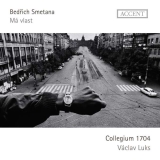Bedrich Smetanas zwischen 1874 und 1879 entstandener Zyklus Ma Vlast (Mein Vaterland) wird vom Collegium 1704 gespielt. Dirigent Vaklav Luks berücksichtigt dabei angeblich historische Besetzungsstärken, Instrumente und Aufführungspraxis. Dass die Musik, so aufgeführt, anders klingt, neue Farben und einen ganz reizvollen Detailreichtum bietet, lässt sich nicht bestreiten. Davon profitiert zu Beginn schon die erste Tondichtung, Vysehrad, in der Luks freilich mehrmals der Atem ausgeht, wodurch die Musik an expressiver Kraft verliert. Dasselbe passiert in der Moldau, die zwar sehr alert beginnt, aber dann gelegentlich absackt. Andere Passagen werden sehr reizvoll dargestellt.
Die dritte Tondichtung, Sarka, in der die Legende um die böhmische Amazonenkönigin Sarka und der blutige Böhmische Mägdekrieg thematisiert werden, gelingt Luks recht spannungsvoll und in dem pastoralen Stück ‘Aus Böhmens Hain und Flur’ kommt durch das Instrumentarium und die klangliche Transparenz eine sehr schöne Interpretation zustande.
Die beiden eng mit dem Hussitentum verbundenen Stücke Tabor und Blanik werden akkurat interpretiert, aber die dramatische Kraft eines Harnoncourt (um nur ein Beispiel zu nennen) erreicht Luks nicht. Und am Ende bleibt mir trotz neuen Farben nicht genug, um diesen Zyklus in die Bestenliste der Komposition aufzunehmen.
Bedrich Smetana’s cycle Ma Vlast (My Fatherland), composed between 1874 and 1879, is performed by Collegium 1704. Conductor Vaklav Luks supposedly takes into account historical instrumentation, instruments and performance practice. That the music, performed in this way, sounds different, offers new colors and a quite delightful richness of detail, cannot be denied. The first tone poem, Vysehrad, already benefits from this, although Luks runs out of breath several times, which causes the music to lose expressive power. The same happens in Vltava, which begins very alertly but then occasionally sags. Other passages are very charmingly rendered.
Luks manages the third tone poem, Sarka, which focuses on the legend of the Bohemian Amazon Queen Sarka and the bloody Bohemian Maidens’ War, quite excitingly, and in the pastoral piece ‘From Bohemia’s Woods and Fields’, the instrumentation and the resulting transparency produce a very fine interpretation.
The two pieces closely associated with Hussitism, Tabor and Blanik, are interpreted accurately, but Luks does not achieve the dramatic power of Harnoncourt (to cite just one example). And in the end, despite new colors, I am not left with enough to put this cycle in the best of list.
























